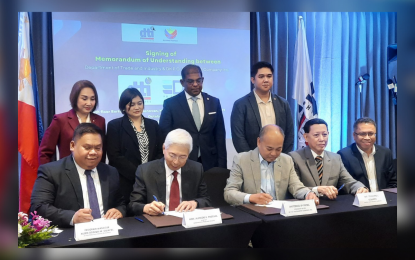To achieve the target of 15.4 million certificates, at least 102,000 certificates are required to be issued per day until October.
 Coordinating Minister for Economic Affairs Airlangga Hartarto gave a press statement after a limited meeting led by President Joko Widodo and attended by Vice President Ma’ruf Amin on Wednesday, May 15, 2024.
Coordinating Minister for Economic Affairs Airlangga Hartarto gave a press statement after a limited meeting led by President Joko Widodo and attended by Vice President Ma’ruf Amin on Wednesday, May 15, 2024.JAKARTA, KOMPAS — In a limited meeting held at the Merdeka Palace, Jakarta, President Joko Widodo stated that he agreed to postpone the obligation to halal certification for micro, small and medium enterprise products. The halal certification obligation was initially set on October 17 2024, then postponed to 2026. Meanwhile, the halal certification obligation for large and medium-sized entrepreneurs remains set in October 2024.
The postponement of halal certification obligations for MSMEs will be reflected in the revision of Government Regulation Number 39 of 2021 concerning the Implementation of the Halal Product Guarantee Sector as regulated in the Job Creation Law. This was stated by the Coordinating Minister for Economic Affairs Airlangga Hartarto when giving a press statement after a limited meeting chaired by President Jokowi and attended by Vice President Ma’ruf Amin, Wednesday (15/5/2024) .
According to Airlangga, the government targeted the number of halal certifications at 10 million certificates, but the realization was only achieved with 4,418,343 certificates. “So, it is still far from being achieved. Therefore, even though we see that MSMEs that have been certified in 2023 and 2024 have increased compared to before the enactment of the Ciptaker Law, we see that of the 4,431,670 self-declaration MSMEs are 64 percent, so it has happened improvement,” he said.
President Jokowi then decided to delay the halal certification for food and beverage SMEs, cosmetic products, medical devices, as well as traditional herbal medicines until 2026. However, for large and medium-scale entrepreneurs, the government still imposes the obligation of halal certification until October 17, 2024.
For imported products, halal certification will only apply if the country has signed a mutual recognition arrangement (MRA) with Indonesia. In the meeting, Minister of Religion YaqutCholil Qoumas reported that 16 countries had signed the MRA. “So, countries that have carried out MRA are enforced because they are certified as halal in the country of origin so the goods can enter,” said Airlangga.
Budget limitations
Airlangga acknowledged that one of the reasons for delaying halal certification obligations for MSMEs is the limitation of the budget. With the postponement of the halal certification obligations for MSMEs, Airlangga hopes that the budget allocation will be more flexible until 2026. Besides the budget, the delay in halal certification is also related to many MSMEs who are unwilling to formalize their business with a business identification number (NIB).
“Well, the requirement is for the MSME to obtain a new NIB certification, so it requires some time for socialization because they are worried about what their tax NIB would be like. However, regarding taxes, there are already regulations in place whereby those with less than Rp 500 million are not subject to taxes, and so on,” added Airlangga.
Postpone certification obligations
Found at the Presidential Palace Complex, the Minister of Cooperatives and Small and Medium Enterprises, Teten Masduki, stated that the remaining 150 days until October 17, 2024 is not feasible for all small and medium enterprises to obtain halal certification. Teten mentioned that the current capability of the Halal Product Assurance Organizing Agency (BPJPH) to issue halal certification is only 2,600 certificates per day.
To meet the target of issuing 15.4 million certificates, at least 102,000 certificates need to be issued daily until October. “Looking at data from the BPJPH today, the average is only 2,678 certificates, so it’s impossible. That’s why I believe President’s decision to delay the certificate obligation until 2026 is appropriate. If it is forced, not only is it impossible, but they will also be considered breaking the law and could cause legal problems,” he added.
Apart from budget issues, according to Teten, the halal certification target was not achieved due to the imbalance between demand for halal certificates and the ability to provide certification. ”There are two certifications. The regular ones have their own costs, while the self declare ones are funded by the government through BPJPH. Well, the numbers don’t match, so it’s very small. The needs are around IDR 3.5 trillion, but what is currently available is only IDR 230 billion at BPJPH. “So, it is right for the President to postpone,” said Teten.



